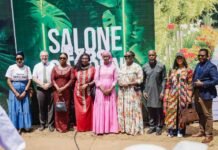By Alvin Lansana Kargbo
The Africell Impact Academy Foundation, in collaboration with the Royal Botanic Gardens, Kew, held an insightful workshop titled “Navigating the Future: Ensuring the Resilience of Trees in Evolving Climates” on Tuesday, November 12, at the Tunde Cole Building, Fourah Bay College (FBC), University of Sierra Leone. The event gathered students, faculty from the Biological Sciences Department, and experts from Kew Gardens to discuss the long-term impacts of climate change on trees, urban greenery, and botanical landscapes.
The workshop was attended by a diverse audience, including the Head of Department (HOD), lecturers, and students eager to explore innovative approaches for managing climate risks in Sierra Leone’s natural and urban environments. The initiative aimed to provide participants with knowledge and practical insights to address the challenges facing environmental science and conservation.
Africell’s Public Relations Manager, Abdul Karim Sesay, welcomed attendees, emphasizing the urgent relevance of the topic. “Climate change is not a distant issue; it impacts every tree, garden, and natural resource we rely on. Africell Impact Academy believes in the power of knowledge to drive change,” he stated. Sesay highlighted Africell’s commitment to conservation and education, noting that the partnership with Kew Gardens was aligned with their mission to equip young minds with the skills needed to protect Sierra Leone’s natural legacy.
Dr. Williams, Head of the Biological Sciences Department at FBC, underscored the department’s dedication to scientific research and the valuable, longstanding partnership with Kew Gardens, which has contributed to identifying new plant species in Sierra Leone. “Our collaboration with Kew Gardens has strengthened our research capacity and expanded opportunities for our students and faculty,” Dr. Williams said, encouraging students to leverage such learning opportunities to make meaningful contributions to environmental science.
Despite other obligations with the university’s Vice-Chancellor, Dr. Williams attended the event, further demonstrating his commitment to advancing environmental studies at FBC. He also expressed the department’s ongoing efforts to enhance technical and research capabilities, citing the need for improved connectivity and resources for scientific research.
The workshop featured two distinguished speakers from Kew Gardens: Kelvin Martin, Head of Trees Collections and Arboriculture, and Thomas Fry, a researcher in climate change and tree resilience. Their presentations offered in-depth insights into the challenges confronting arboreal landscapes and the need to adapt conservation strategies to protect biodiversity. Kelvin Martin led a session on the effects of climate change on tree populations and urban green spaces, followed by a question-and-answer segment where Martin and Fry addressed queries on climate adaptation, species conservation, and future research collaborations.
The event was hailed as a success, sparking active student engagement and deepening interest in environmental science. The workshop concluded with a commitment from Africell, FBC, and Kew Gardens to continue their joint efforts in conserving Sierra Leone’s natural heritage for generations to come.




